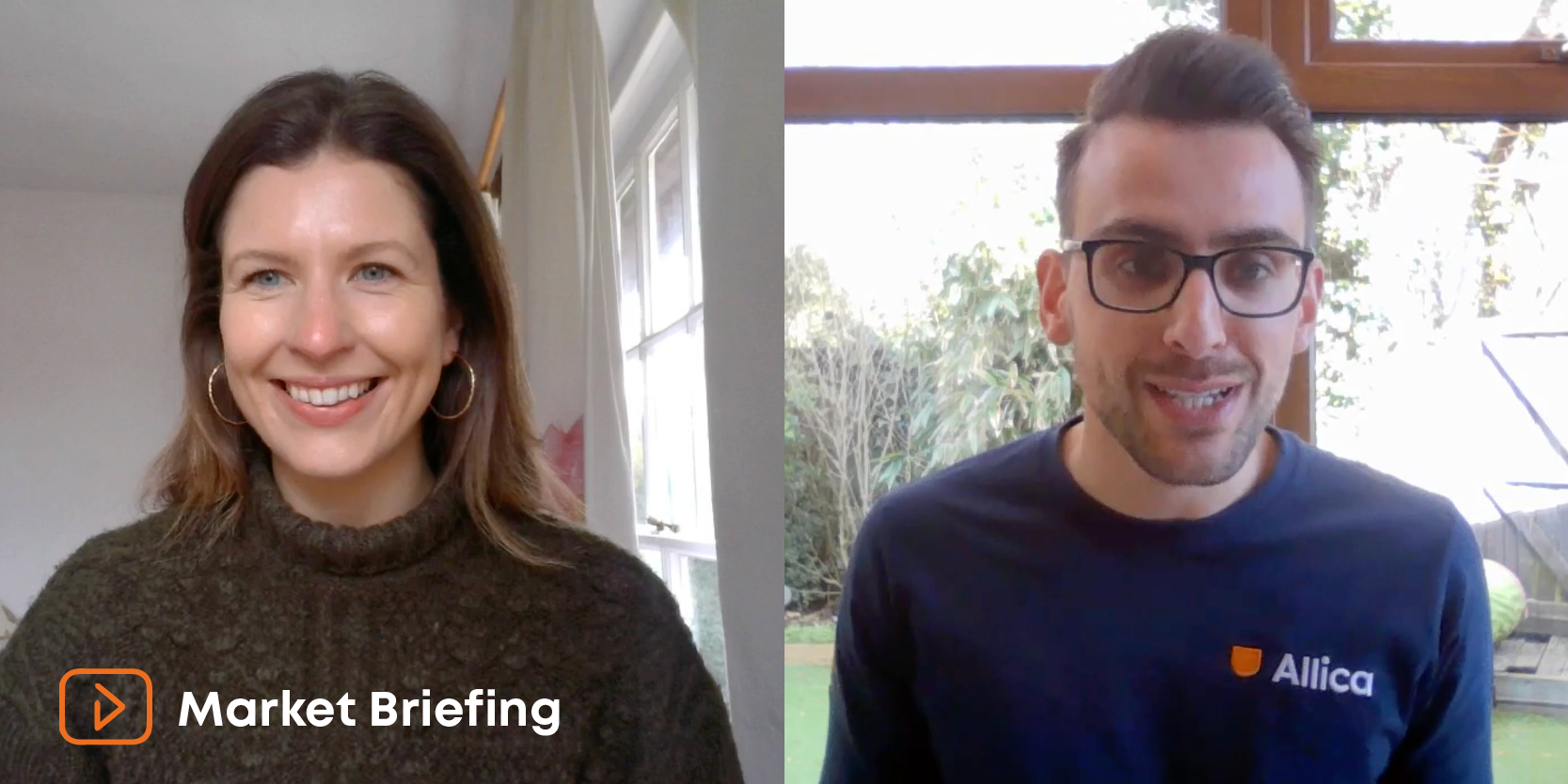Accountants are in a tough place; being asked to be all things to all clients as banks have scaled back their services. The ‘added extras’ of days gone by have become necessary fixtures of many accountants’ work as the banking expertise that a relationship manager used to provide has disappeared, with accountants often expected to pick up the slack
Greater demands have left accountants overstretched. It’s not right and it’s something we’re eager to change.
In this Market Briefing, Matt West, Relationship Manager in the South West, speaks with Sophie Hossack, Allica Bank’s Head of Partnerships to discuss the current business banking landscape for accountants.
Sophie’s close work with our accountant partners has given her a unique (and broad) view of what is and isn’t working for them right now. Read on to learn about the changing market of business banking and how it can add real value to you and your clients.
Business banking: today’s landscape for SMEs and accountants
Sophie was quick to pinpoint two fundamental issues with business banking for SMEs and their accountants.
The loss of relationships
A lot of the firms that Sophie speaks to report that, 10, 15, or 20 years ago, they had had “really close relationships with their local branch - the team based there and the relationship manager and banker in that branch. They'd be able to introduce clients really confidently because they knew the person there.”
As high street banks have retrenched in the years since and at such a large scale, “a lot of these firms actually don't know who to contact at their local branch.”
It’s a sad state of affairs and quite shocking, knowing how things used to be.
Less reliable networks
“The second part of the problem,” Sophie explained, “is that their clients are coming to them with a lot of frustration. They hit that moment in time where they can't access funding anymore, their account is being closed, or the experience they're getting from their existing bank isn't enough. They’re frustrated, they're anxious. It’s really stressful when you're talking about these things.”
“So the business owner is saying to their accountant: who do you recommend? Who do you trust? And the accountant isn't able to provide an answer confidently anymore.”
“The bank manager used to be the heart of the business ecosystem.”
Matt agreed, remarking that “when you had something that you wanted to talk about in your business, you’d pop down your high street, talk to the local bank manager and discuss your business plans.”
In just a short time, banks have shifted from proud partners of SMEs to barely-there mirages.
How accountants have had to step up
“Bank managers have slowly faded away,” Matt lamented, “and that has meant more and more businesses, particularly heritage businesses, now no longer have a bank manager to talk to. Who's filled that void? Now they're more likely to go and talk to their accountant.”
The balance has tipped and accountants are having to offer more than ever before, but that’s not been all bad.
A new dawn for specialist accountants
Sophie noted that technology has helped drive the changing shape of many firms. “They've been able to be more efficient and effective because of the technology stack they're using. They’ve gained the time and the energy to focus on what the client experience looks like, which services they want to offer and which specialisms and sectors they want to professionalise in.”
“Firms have been able to choose where they enjoy spending their time,
skills and energy.”
With their newfound niches, it’s become crucial for firms to look at how they package their services. “How do they actually monetise that business advice? How do they monetise the support that they're providing? If they can make the admin, compliance and bookkeeping run in parallel with a deeper service level that's valuable to their customers.”
The space for banks to make an impact
This is where banks and their relationships with accountants can be so useful. Banks have the opportunity to open up ”valuable conversations and provide really tactical, practical help and advice to support their clients.”
A close relationship like this can unlock conversations that fit the more valuable long-term strategic thinking many accountants aim to provide.
A great relationship with a bank gives accountants “another reason to contact their client in a way that's above and beyond bookkeeping and administrative accounting.”
How challengers are changing the market
Matt wanted to dig into the ways challenger banks are stepping up to give accountants and their SME clients a better service, after a couple of decades in the dark with incumbents.
Challengers have asked the fundamental question: “can the experience of banking look and feel different? Over the last 10 to 15 years, we've become so used to the bare minimum.”
The ‘new normal’ was no good for SMEs or accountants
Sophie recalled many instances of asking business owners what their banking experience is like, only to hear back that: ‘I don't really hear from my bank and that's probably okay’.
“We've gone so far to the other end of the spectrum that there's no service and no proactive nature to the relationship. Actually, there may not be a relationship at all.” People have adjusted to this extreme end of service and forgotten what it can be like.
“I think the challenger banks have done a really good job with the digital experience and accessibility, making it easier and more user-friendly, and more conducive to doing work through your banking product.
Bringing relationships back
Not all challengers are focused on relationships, but Allica is certainly one of the operators that is.
“We're really trying to get under the skin of these larger, more complex businesses and the challenges, obstacles and opportunities they have. It’s an important role to play and it's a role that doesn't really exist - there aren't a huge number of banks supporting the business owner at this level.
“We've got an opportunity here to be a really valuable partner both to the business owner and their accountant.”
Sophie wanted to stress that all of this work is done “side-by-side, shoulder-to-shoulder with the accountant serving the business owner. We are on the same team, working to support the business owner towards continued success. The more we can partner, the more we know each other, the better.”
Matt summarised the position nicely, saying: “banking has moved from a service to being a product. Clients and accountants probably view banking as a provider of accounts, savings, and credit products. We’re trying to take that back a notch and ask what clients want to achieve and how we can add value.”
Working in a different interest rate environment
Beneath the bigger picture of SME banking and its relationship with accountants, Matt also wanted to ask Sophie about the practicalities of banking - especially in our relatively new high rate environment.
Where to look for more
“We’re in a real moment in time here where accountants can be practical and proactive. Their clients could be earning quite significant amounts of money on balances that are sitting in zero-rate current accounts.”
If a client has “one hundred thousand pounds, that could be earning a considerable amount over the course of the next 12 or 18 months in fixed term savings accounts or instant access accounts, where there are higher interest rates on the savings.”
What Sophie’s found with some accountants is that, “for so long, this wasn't a conversation that they needed to have.
“They hadn't realised these opportunities were there for their clients.”
From there, “it’s about what they want to do with that money. What does that additional capital look like? How are you going to use it? What's it going towards? Again, this goes back to that advisory, consultative and strategic conversation that firms are aiming to have with their clients. It’s a really exciting opportunity.”
Where to look for less
Sophie also noted that there’s value to be found in looking for products that can offer less – “so, banking and transaction fees and whether their clients are spending quite a lot, but not receiving a lot from it.”
There’s definite value to be found in “looking at alternatives. Savings play a significant role in the advice that you could be giving.”
Matt agreed, noting that savings “are not as well-catered for. You can talk to a really good finance broker who can unlock the market for you. The savings market is not as well acknowledged. It's probably quite an easy way to win client favour. If Client X is earning an extra few thousand – or, if you're fortunate, 30 to 40,000 – pounds a year in interest income, that's a significant cash injection.
Three tips for accountants who want to add value via banking
To close out the conversation, Matt asked Sophie if she had any top tips for how accountants can add value for clients - especially through banking.
Tip 1: Prepare to be reactive
“It's happening up and down the country, week in week out. The firms we're talking to tell us that their clients have reached that frustration point and they're coming for a solution. They want an answer and help.”
“For firms, it's really important that they have people they can signpost to - both banks and specific people there who can actually support. Someone to have that phone call, conversation or meeting with, and help the client feel that ‘yes, this is the right bank for me’.”
Tip 2: Look for the value-add
“Look at those proactive opportunities to discuss banking,” Sophie stressed. Ideally, “not in a very boring ‘I want to talk to you about banking’ way, but more like ‘where are you heading and what are you trying to achieve this year?’”
The opportunity is there for your clients to move in new ways, benefit from new products and make unexpected progress. Challenger banks are leading the bounce back to a true service model, rather than the anonymised and productised state it’s reached in recent years.
Tip 3: Build relationships
For the previous two tips to be at their best, you’ll need to “build relationships with the banks you already have access to. Make sure you're up to date with what they do, who they help and who they can't help. From there, you’ll be ready to provide that insight back to your client.”
“You might think they need one thing but, actually, the banking team might be able to provide an alternative solution that actually fits the bill a little bit better.”
Accountants deserve more support
In all the conversations we have with accountants, one thing has become abundantly clear: they’ve had to take on so much more work as banks have reduced their services.
We’re eager to do whatever we can to redress that imbalance, to bring banking back into the equation as a supportive partner for businesses.
If you’re interested in learning more about our accountancy partnerships, visit our dedicated accountants page.





